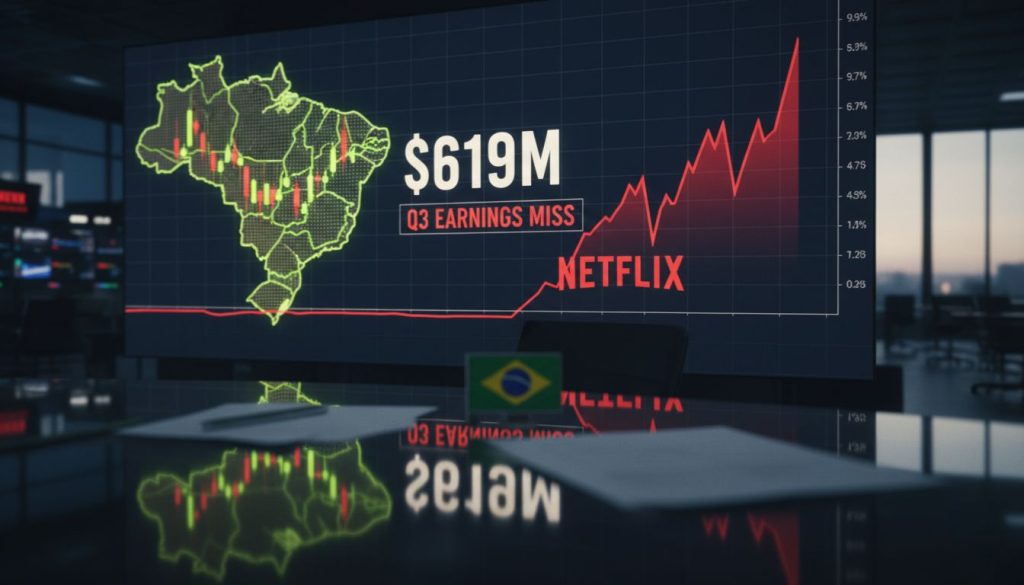
Table of Contents
Netflix Brazil tax dispute has sent the streaming giant’s shares tumbling more than 6% in after-hours trading after the company reported a significant earnings miss attributed to an unexpected $619 million expense. The Los Gatos, California company’s stumble breaks a six-quarter winning streak and exposes vulnerabilities in how even the world’s most dominant streaming platform navigates international tax frameworks.
The streaming leader posted third-quarter net income of $2.5 billion, or $5.87 per share, falling dramatically short of Wall Street’s expected $6.97 per share. Revenue hit analyst forecasts at $11.5 billion, climbing 17% year over year. But operating income of $3.24 billion came in roughly $400 million below both company guidance and analyst estimates, entirely due to the Netflix Brazil tax dispute complication.
Understanding the Netflix Brazil Tax Dispute Details
The Netflix Brazil tax dispute centers on a 10% tax Brazil imposes on payments its domestic entities make to foreign operations. CFO Spencer Neumann explained during the earnings call that Netflix Brazil pays Netflix U.S. for services enabling local subscription offerings. The company initially won a favorable 2022 lower court ruling concluding it wasn’t subject to this tax.
Then Brazil’s Supreme Court ruled against an unrelated company in August 2025, expanding the tax’s scope to cover service payments that don’t involve technology transfer. That broader interpretation forced Netflix to reevaluate its position. “Given that court’s ruling, we now deem the loss to be probable, and that’s why we recorded the expense in Q3,” Neumann said.
About 20% of the charge relates to 2025, with the remainder covering prior years. Netflix had already paid approximately $619 million in 2022 to settle parts of the dispute, making this latest hit particularly painful for the Netflix Brazil tax dispute resolution.
Why the Netflix Brazil Tax Dispute Matters Beyond One Quarter
Neumann stressed two critical points about the Netflix Brazil tax dispute. First, no other tax in any major Netflix market behaves like this Brazilian levy. Second, without this expense, Netflix would have exceeded its Q3 operating income and margin forecasts, and the company doesn’t expect material future impact from the Netflix Brazil tax dispute.
That second point matters significantly. Netflix reported a 28% operating margin for the quarter. Strip out the Brazilian charge, and the margin would have cleared the company’s 31.5% guidance. For full-year 2025, Netflix now projects a 29% operating margin instead of the previously forecasted 30%, with revenue expectations holding steady at $45.1 billion.
Still, analyst interpretations of the Netflix Brazil tax dispute diverge sharply. Investing.com’s Thomas Monteiro worries Netflix is using the tax hit to obscure deeper problems. “The truth is that the company failed to deliver the kind of growth we’ve grown used to over the past couple of years,” he said. Zacks analyst Jeremy Mullin sees it differently, asserting Netflix’s “underlying story remains solid.”
The Streaming Battlefield Gets Messier Amid Netflix Brazil Tax Dispute
This earnings stumble arrives as Netflix faces its most complicated competitive landscape yet. The company now commands roughly 30% of the U.S. streaming market, with Amazon Prime Video matching that share while Disney+ and other rivals chip away at dominance.
Netflix still leads globally with over 300 million paid memberships across 190 countries. But maintaining that position requires relentless content investment. The company poured $13 billion into original programming in 2023, and that spending hasn’t slowed. The animated film “K-Pop Demon Hunters” became Netflix’s most-watched movie ever with 325 million views, prompting toy partnerships with Hasbro and Mattel for spring 2026.
The advertising business shows promise as a new revenue stream. Co-CEO Greg Peters noted the company is on track to more than double ad revenue this year, with the ad-supported tier attracting over 40% of new sign-ups. Netflix reached 91 million monthly active ad-tier users by Q1 2025. Yet even as that business scales, eMarketer’s Ross Benes points out Netflix still won’t disclose how large the ad operation actually is.
International Expansion Versus Local Complexity in the Netflix Brazil Tax Dispute

The Netflix Brazil tax dispute highlights a fundamental tension in the streaming giant’s strategy. International markets represent 55.5% of the company’s subscriber base, with Latin America accounting for 12.4% of net sales. Asia-Pacific growth has been particularly strong. But aggressive global expansion means navigating dozens of distinct regulatory, tax, and legal frameworks.
This isn’t Netflix’s first international tax challenge beyond the Netflix Brazil tax dispute. The company has flagged the Brazilian issue in multiple SEC filings. What changed in Q3 was the Supreme Court ruling that shifted the probable outcome of the legal challenge.
“It’s a bit complicated. It’s a cost of doing business in Brazil,” Neumann acknowledged. “It’s not a tax that’s specific to Netflix. It’s not even specific to streaming. So we assume other companies will be impacted by this.”
That last point raises questions about how other streamers with significant Brazilian operations, particularly Disney+ and Amazon Prime Video, might face similar assessments related to the Netflix Brazil tax dispute framework. Brazil represents a crucial growth market for all major platforms given its large, young, increasingly connected population.
The Warner Bros. Discovery Wild Card
Netflix’s competitive calculations could shift dramatically if industry consolidation accelerates. Warner Bros. Discovery recently signaled it may sell all or parts of its holdings, which include HBO, DC Studios, and CNN. Analysts are already speculating Netflix could join the bidders looking to acquire premium assets like HBO’s content library.
Co-CEO Ted Sarandos noted during the earnings call that Netflix’s total worldwide audience, including multiple people per household, approaches 1 billion. “We have a better understanding of the streaming business than any of our competitors,” co-CEO Greg Peters boasted. That confidence may be justified given Netflix’s data advantages and operational scale, but it also reveals how high the stakes have become.
Disney and Warner Bros. Discovery have both essentially conceded the streaming wars, content to settle as third or fourth players behind Netflix and Amazon. Both companies are cutting release volumes and focusing more on premium brands rather than broad general-audience content. That should theoretically ease competitive pressure on Netflix.
What Q4 Guidance Reveals After Netflix Brazil Tax Dispute
For the fourth quarter, Netflix projects revenue of $11.96 billion against Wall Street’s $11.90 billion forecast, with diluted earnings per share coming in at $5.45, a penny ahead of analyst targets. The company will release the final season of “Stranger Things” in November and December while streaming two live NFL games on Christmas.
That forward guidance suggests Netflix views the Netflix Brazil tax dispute as truly a one-time charge rather than an ongoing margin problem. But investors aren’t entirely convinced. The stock, which had climbed 39% this year ahead of the earnings release, fell to $1,171.24 in extended trading.
The bigger question is whether this episode represents an isolated tax complication or signals broader challenges as Netflix matures into a truly global entertainment utility. The company stopped reporting subscriber numbers at the end of 2024, pushing investors to focus on revenue and profit instead. That strategy works brilliantly when both metrics exceed expectations. When they don’t, even with legitimate explanations like the Netflix Brazil tax dispute, the market reaction can be swift and unforgiving.
The Path Forward: Profitability Over Growth
Netflix’s evolution from scrappy disruptor to mature entertainment conglomerate brings new vulnerabilities beyond the Netflix Brazil tax dispute. Rising content costs, fierce competition from well-funded rivals, and complex international regulatory environments all pressure margins. The Brazilian tax dispute, while unique in its specifics, illustrates how operational complexity grows alongside global scale.
The company is diversifying beyond pure streaming into video games, live events, consumer products, and advertising. That diversification makes strategic sense for a platform approaching saturation in core markets. But it also means Netflix must excel at managing different business models simultaneously while maintaining the content quality that made it dominant in the first place.
Wall Street will be watching closely whether Netflix can maintain operating margins above 29% while continuing to invest heavily in content and new business lines. The ad-supported tier needs to scale substantially to offset slowing subscription growth in mature markets. Live sports and events like the Christmas NFL games represent costly bets that must pay off in engagement and retention.
For now, Netflix remains the clear leader in global streaming by most metrics: subscribers, revenue, profit, and content investment. But Tuesday’s earnings stumble, tax complications aside, reminded investors that maintaining that leadership position gets harder every quarter as competition intensifies and easy growth dries up.
The Netflix Brazil tax dispute may well be what Netflix claims: an isolated, non-recurring charge that won’t materially impact future results. Or it could be the first of many such complications as the company navigates the messy reality of operating a truly global media business at unprecedented scale. Either way, Netflix’s ability to deliver consistent margin expansion while managing international complexity will define whether its streaming dominance proves durable or temporary.